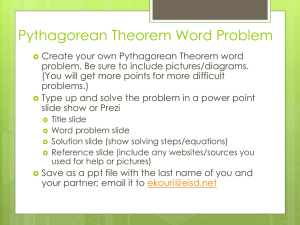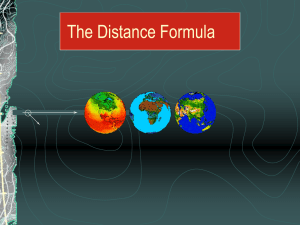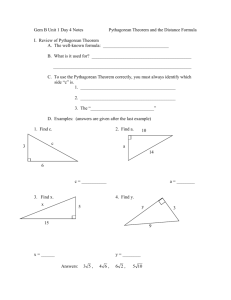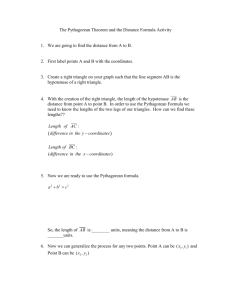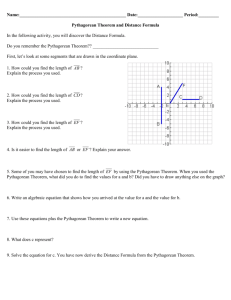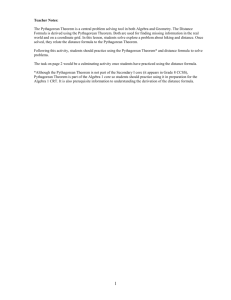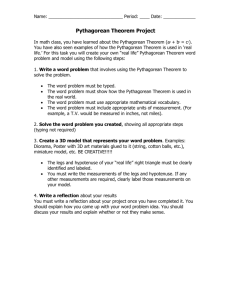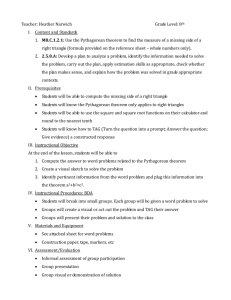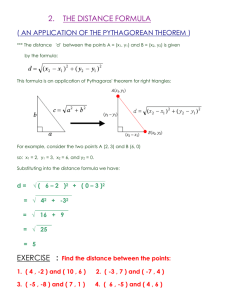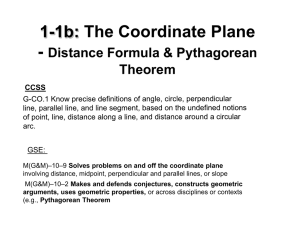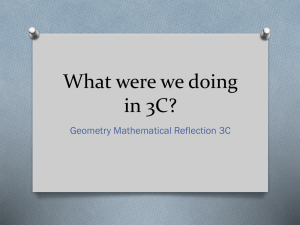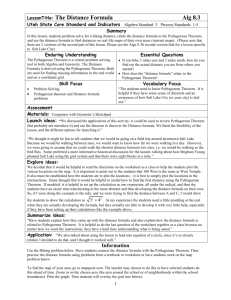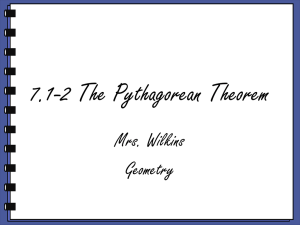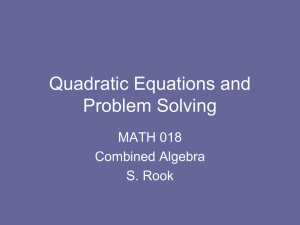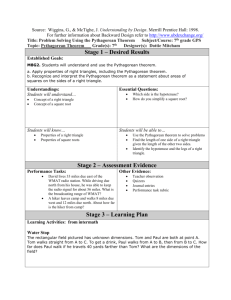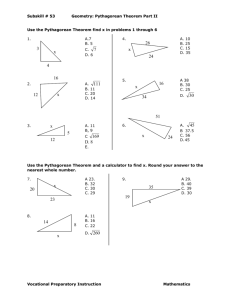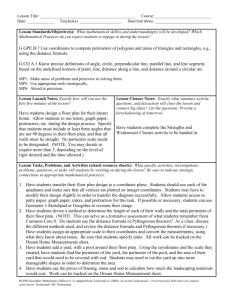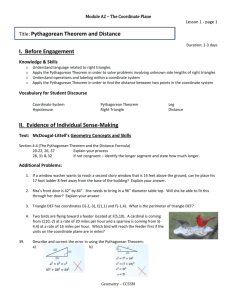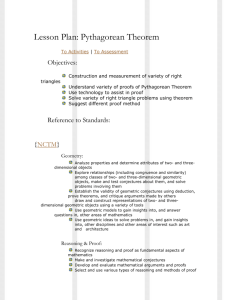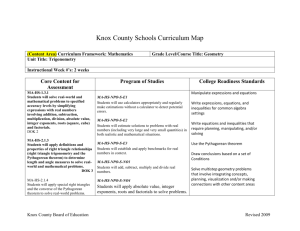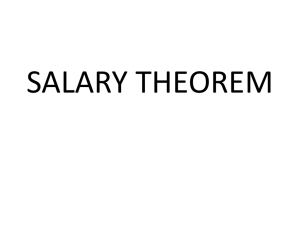pptx - My Educational Portfolio
advertisement
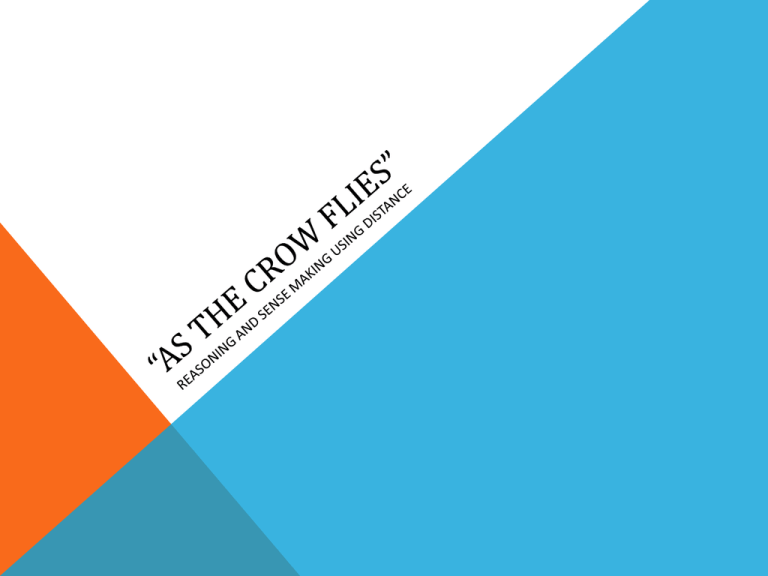
“THE DISTANCE FORMULA IS OFTEN PRESENTED AS A ‘RULE’ TO MEMORIZE” PURPOSE • To help students to develop an understanding of the meaning of the distance formula. • A review of the distance formula. • To present a real-world problem using the distance formula. • To encourage students to use reason to find a solution. TASK OVERVIEW • Compute the distance between two locations in a city. • City streets are laid out on an evenly spaced square grid. • Define a coordinate system and think about how to compute the distance. REASONING HABITS / PROCESS STANDARDS • Analyze a problem using relationships and structure • Use connections across different representations • Reflect on the solution • Problem solving to build new knowledge. • Understand how math ideas interconnect. • Use representations to model and interpret physical, social, and mathematical data. STANDARDS FOR MATHEMATICAL PRACTICE 2. Reason abstractly and quantitatively. 4. Model with mathematics. 7. Look for and make sense of structure. STANDARDS FOR MATHEMATICAL CONTENT 5.G Graph points on the coordinate plane to solve realworld and mathematical problems. 8.G.7 Apply the Pythagorean Theorem to determine unknown side lengths in right triangles in realworld math problems. 8.G.8 Apply the Pythagorean Theorem to find the distance between two points in a coordinate system. THE CLASS • • • • • • • 9th grade Transitional Algebra at LHS 23 students in class, 12 boys, 11 girls 21 students present for this lesson 20% are repeating this class Class grades: 84 high, 76 average, 66 low Teacher said they work at “5th grade level” Students were encouraged to work in pairs. Most did not. TASK / PROBLEM LESSON 1. How many blocks would you have to drive to get from your house to your friend’s house? Draw a path that you would drive, and calculate the distance. “BEFORE WE BEGIN…” Presentation and discussion reveals that the students: •Have worked with the Pythagorean Theorem this year, and in at least 3 earlier grades. •Have worked with the coordinate plane. •Understand the layout of a city grid. •Understand what the problem is asking them to find. •Require brief instruction to address misunderstandings regarding helicopter flight. QUESTIONS 1-2: PRE-CLASS DISCUSSION Misconceptions: • Students did not recognize that helicopter path was different from car path. • Comments included travelling same path as car, but going faster. • Some students recognized the flight path as on the diagonal, but: • Explained the shorter time in relation to speed. QUESTIONS 1-2: PRE-CLASS DISCUSSION Misconceptions (cont): • Did not recognize the shape as a triangle, so did not connect the solution to the Pythagorean Theorem. • Explained with confidence that there was no way to calculate an exact distance, because they couldn’t count the boxes accurately. • They attempted to solve the problem using ratios, implying that they were trying to relate the task to a more recent lesson on similar triangles. STUDENT EXAMPLE 1 STUDENT EXAMPLE 2 DISCUSSION OUTCOMES 1. Students were directed to observe the shape of the graph, eventually recognizing a triangle. No one noted the type of triangle. 2. When told it was a right triangle, students needed much directed talk to bring forth the Pythagorean Theorem. 3. Once the Pythagorean Theorem was in mind, the students worked the problem quickly, finding the value of “C.” OBSERVATIONS Reasoning Skills • • • • Students did not connect prior skills and knowledge. Did not recognize city grid as coordinate plane. Did not recognize the shape as a right triangle. Students could place appropriate points on the grid, once directed, but could not build a viable model of the problem using mathematics. OBSERVATIONS Sense Making: Students Struggled To Make Sense • Following the class discussion, students struggled to connect the answer, “C=11.7” to the distance of travel. • Students could be successful in each individual skills, but struggled to make connections that led to problem-solving. OBSERVATIONS Sense Making (cont) •Students were unable to construct models for a follow-up question, #5, which may imply that they did not engage in sense making during the earlier task. •Some students chose to measure the hypotenuse in inches, and continued to believe the measurement was correct even after discussion of the Pythagorean Theorem. STUDENT WORK: QUESTION 5 REFLECTIONS • Students in this class seem to view math as disjointed skills with no realworld application. • Many of these students have a history of poor performance and poor work habits in math and have developed a “why bother” attitude, which robs them of the ability to actively engage in problem solving. • Some of the lower performing students showed strong potential to succeed using this method, as two students from the bottom half of the class attempted all 5 questions with success. It would be interesting to see how the students would respond to lower level tasks, building slowly toward more challenging current grade-level work. • Students seemed to have a good toolbox of skills and knowledge, but may lack the confidence to use their tools appropriately and at the right times. MORE SOLUTION ILLUSTRATIONS, Q #5 The End “the crow has landed”
